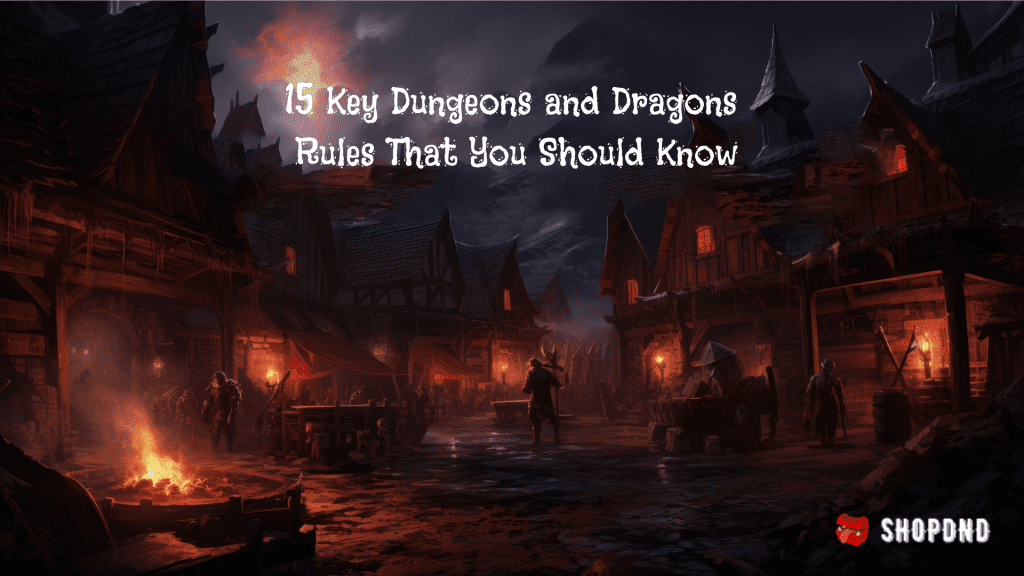
15 Key Dungeons and Dragons Rules That You Should Know
Welcome to the magical world of Dungeons and Dragons, a place where imagination meets adventure! Understanding the key rules of Dungeons and Dragons can massively enhance your gameplay experience which can make each adventure more enjoyable and smooth. Whether you’re just starting or you’ve been adventuring in fantasy worlds for a while, our article will help you simplify essential DnD rules for players at all levels.
1. How the Game Uses Dice
Dice are fundamental in Dungeons & Dragons, they serve as the arbiters of fate and decision-makers for nearly every action in the game. Each dice roll, from the d4 to d20 has outcomes that impact a battle prowess to skill effectiveness. This random element introduces uncertainty, making strategic planning and risk assessment crucial. Players must understand the significance of each type of dice to fully engage with the mechanics and enjoy the unpredictability they bring to the storytelling.
2. Character Creation and Development
Character creation is the first step in a player’s journey into D&D. This process involves choosing a race (such as humans, elves, or dwarves), a class (like wizards, rogues, or warriors), and specific attributes that define the character’s strengths, weaknesses and magical abilities. You can learn more about this in our player guide to races and classes.
As the game progresses, these characters gain experience, develop their skills, and may even change based on the choices the player makes, influencing not only their own story but also the dynamic of the entire gameplay.
If you are interested in learning more about Dungeons and Dragons classes, our article about classes may help you.
3. The Combat System
The combat system in D&D is a complex dance of strategy and chance, where players engage in turn-based battles by using a combination of dice rolls and character-specific abilities. Understanding the order of combat, the effects of different weapons and spells, and how to effectively use terrain and positioning can turn the tide of battle. Mastery of DnD combat rules is essential for players who want to lead their characters to victory.
4. Magic and Spellcasting
Magic in D&D is a potent tool that can alter the fabric of gameplay. Players with spellcasting characters must manage a limited resource-spell slots-which are used to cast spells. Different spells have varied effects and can require intricate components or specific verbal and somatic actions. The strategy behind when and how to cast spells plays a critical role in the success and survival of spellcasting characters.
5. Ability Checks
Ability checks are crucial for navigating the challenges and tasks that characters encounter. Whether attempting to climb a cliff, persuade a guard, or recall ancient lore, these checks involve rolling a d20 and adding relevant ability modifiers to meet or exceed a difficulty set by the Dungeon Master. The outcome can significantly affect the story’s progression and the character’s development.
6. Saving Throws
Saving throws are reactive dice rolls that determine a character’s resilience against spells, traps, poisons, and various other dangerous situations. Unlike ability checks, saving throws are prompted by external threats and can have immediate consequences on a character’s health and status within the game. Players must understand their characters’ saving throw proficiencies to effectively navigate these perils.
7. The Alignment System
The alignment system categorises characters according to their ethical and moral perspectives-good vs evil, law vs chaos. This framework helps guide decision-making and role-playing, influencing how characters might react in complex scenarios. Alignment affects not only the character’s interaction with the game world but also relationships within the adventuring party.
8. Advancement and Levelling Up
As characters overcome challenges and achieve goals, they gain experience points (XP) leading to levelling up. This advancement is crucial as it enhances a character’s abilities, hit points, and skills, allowing access to new powers and spells. Effective levelling requires players to make strategic decisions about their character’s growth path, based on their role in the group and the campaign’s needs.
9. Equipment and Inventory Management
Effective management of equipment and inventory can greatly influence a character’s effectiveness in various situations. Players must choose wisely from weapons, armour, magical items, and other resources. You also need to Balance the weight, utility, and cost of gear to ensure that characters are adequately prepared for the adventures ahead without being encumbered.
10. Rules of Engagement in Combat
Understanding engagement rules is crucial for tactical gameplay. This includes knowing the range of weapons and spells, the use of cover, and how movement affects opportunities for attack and defence. These DnD rules govern how characters interact with each other and the environment during combat, making strategic thinking as important as brute strength.
11. Exploration and Interaction
Exploration in D&D involves discovering new locations, solving puzzles, and interacting with non-player characters. The DnD rules governing these activities encourage players to use their skills creatively, making exploration a dynamic part of the storytelling process. How players choose to interact with the world can lead to new adventures or significant consequences.
12. Using Skills
Skills in D&D cover a broad range of abilities, from stealth and acrobatics to history and arcana. Proficiency in skills determines a character’s effectiveness in performing specific tasks that can affect the narrative and outcome of missions. Players must strategically develop their skills to suit their characters’ roles in the party.
13. Group Dynamics and Team Play
D&D is inherently a collaborative game, which requires players to work together to overcome challenges. The dynamics of the group can significantly affect the gameplay experience, particularly if your group is roleplay-heavy. Learn more in our post about how to play D&D characters in a group.
From a rules perspective, effective team play involves understanding each character’s strengths and weaknesses, strategizing together, and sometimes making sacrifices for the greater good of the group.
14. Handling Game Challenges
Challenges in D&D range from battle encounters to complex moral dilemmas. Handling these effectively requires critical thinking, creativity, and the willingness to take calculated risks. Players are encouraged to engage deeply with the game setting and lore to find innovative solutions to the challenges they face.
15. Etiquette and Fair Play
Maintaining etiquette and fair play is crucial for a positive and enjoyable gaming experience. This involves respecting the Dungeon Master and fellow players, adhering to the agreed-upon rules, and playing in a spirit of cooperation and fairness. Observing these social norms helps ensure that the game is fun and engaging for everyone involved.
Frequently Asked Questions
How can I quickly reference DnD basic rules during gameplay?
To quickly reference rules during D&D gameplay, you can use rulebooks with tabs on the sections most relevant to your character or the game’s scenario. Many players also use digital tools and apps designed for D&D, which allow for swift searches of specific rules. Keeping a cheat sheet handy with common rules, such as combat sequences, spellcasting requirements, and saving throws, can also speed up gameplay and help maintain the flow of the game.
What are some DnD basic rules often misunderstood by new players?
New players often misunderstand rules related to spellcasting, particularly the differences between spell slots and prepared spells. Another common confusion arises with the combat system, especially around actions available during a turn, such as the differences between an action, a bonus action, and reactions. Initiative and how it dictates the order of turns in combat can also be tricky, as well as the rules for opportunity attacks, which aren’t always intuitive.
How do house rules affect the standard rules of D&D?
House rules modify or completely alter the standard rules of Dungeons & Dragons to suit the preferences of a particular group. These can affect the game by simplifying complex rules, enhancing the fun, or balancing gameplay elements perceived as unfair or unenjoyable. While house rules can greatly improve personal enjoyment, they may create inconsistencies when players move between different groups or play in official settings, as these modifications are not universally recognized.
What are the Players’ Initiative Rules in DnD?
In Dungeons & Dragons (D&D), initiative determines the order of turns during combat. At the beginning of a battle, each player rolls a twenty-sided die (d20) and adds their character’s initiative bonus, which is typically derived from the Dexterity modifier.
The result determines the sequence in which players and their adversaries act during each round of combat. The higher the roll plus the modifier, the earlier the player acts. This rule keeps combat organised and determines tactical advantages or disadvantages based on the speed of reaction to threats or opportunities.
Conclusion
Understanding these 15 essential Dungeons and Dragons rules will help you get the most out of your Dungeons and Dragons experience. Remember, the main goal is to have fun and create memorable stories with friends!
If you’re just getting started, consider reading our guide to character builds for new players. This will give you a head-start, letting you get to grips with the rules with a guide to help you through the early levels.
If you’re also looking for great DnD clothing to enhance your game night style, why not check out our store? We feature designs will surely be loved by DnD beginners and enthusiasts alike.


